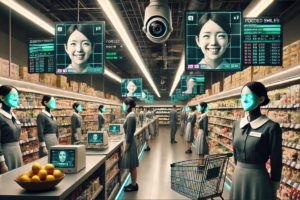In what may be regarded as a world-first in technology and customer experience excellence, one Japanese supermarket has now introduced AI to scan staff members’ smiles. The innovation is aimed at enhancing customers’ experience by keeping the staff friendly and welcoming all the time. This supermarket is aiming high: setting new standards in customer service with AI while creating a positive and engaging work environment.
This supermarket, a very forward-thinking business, installed high-powered AI cameras at each checkout counter and other vantage points within the store. It is fitted with advanced facial recognition software that can monitor staff facial expressions in real-time to ascertain how often they are smiling and how genuine the smile is. Of course, this would all be used solely to track the frequency of smiling and genuineness of the smile, as it directly speaks to customer satisfaction and service delivery.
It is part of a broader initiative aimed at incorporating technology into the daily operations of businesses in order to increase efficiency and customer relations. The AI system provides immediate feedback to the staff in order to keep them cheerful and friendly; this feedback system is built not only for better customer treatment but also to enhance the friendliness of the shopping environment, thereby improving customer loyalty and retention.

Furthermore, this AI technology does not just detect any smile; it is attuned to see the difference between a real and a forced smile. This gives an actual reading on the level of employee engagement and morale. This is very critical in that it will be pointing out to the management where additional training or support is needed to make people really happy and motivated about their jobs.
The introduction of AI to evaluate employee smiles has been met with some enthusiasm and a little skepticism. As far as the supporters are concerned, this will prove to be one of the great leaps forward for retail technology—a data-driven route to improved customer service. Measuring things that are subjective about the performance of employees will allow the supermarket to develop much more focused, and therefore efficient, training programs. The end result must be a higher level of service achieved for the benefit of customers.

Other critics, however, have responded to the effects this form of constant monitoring would have on employee privacy and well-being. Their argument is that it can build an atmosphere of pressure and stress that might lead to deleterious outcomes, which are contrary to the benefits intended by the initiative. It is for these very reasons that the supermarket has instigated stringent data privacy measures to allay such concerns and has been at great pains to emphasize that the AI system is primarily there to support and enhance the experience of staff—not to penalize or micromanage them.
The supermarket has also established clear policies and transparency on using this data. Employees are aware of the reason behind this AI technology and how it will affect their routines in terms of time. Regular meetings and feedback sessions ensure that employees feel supported and valued, not constantly scrutinized. All this open communication is very critical in holding up a positive workplace culture while implementing such advanced technology.
This bold move by the supermarket to start using AI in assessing employee smiles reflects a wider trend in retail wherein businesses are trying to make a comeback through technology. With the aid of AI, companies would be able to find more about customers’ tastes and employees’ performance, thus helping them make effective decisions. The trend is likely to pick up once more retailers join the bandwagon of using AI in their operations.
Further ahead in the future, the supermarket will implement AI technology in other store operations, such as inventory management and analysis of customer behavior. In this way, effortlessly functioning, responsive, and customer-oriented shopping experiences will be achieved by the company. The results of the smile rating project will therefore show the way to other innovations using technology in the retail sector and prove the potential that AI has in improving the performance of employees and satisfying customers.
This thus exemplifies that the deployment of AI technology in assessing employee smiles at this Japanese supermarket forms a huge milestone achieved in integrating artificial intelligence into retail. The potential for AI to revolutionize customer service resides in providing, in real-time, actionable insight into employee behavior and performance. While genuine concerns over privacy and employee welfare do exist, proactive measures to correct those concerns reflect, on the contrary, how much this supermarket values a supportive and positive work environment. With further changes hitting the retail industry, successful execution in this application of AI proves to be a leading example to businesses looking to do the same: how to harness technology in a way that will improve both customer and employee experiences.
